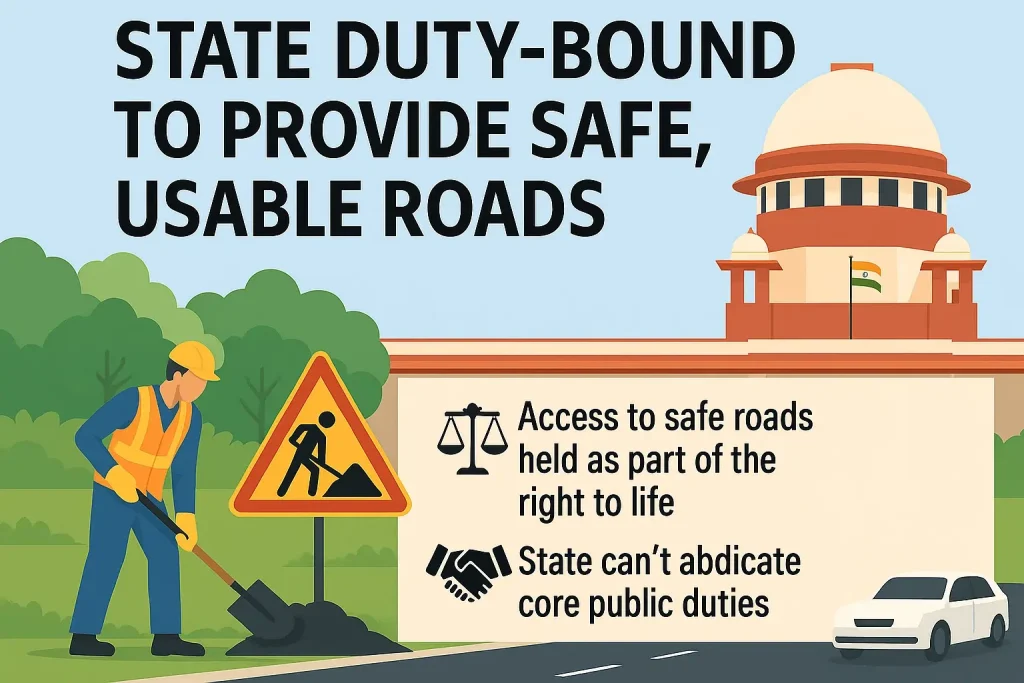
In a groundbreaking decision with wide-ranging consequences for infrastructure governance in India, the Supreme Court on July 30, 2025, reiterated the constitutional duty of the State to provide safe, well-maintained, and motorable roads in the context of the right to life under Article 21 of the Constitution. In the course of this ruling, the Court also placed considerable weight on the non-delegable obligations of government for essential public functions like roads and conducted a cautionary note on governments who abdicate their essential responsibilities to private players without constraint.
Case Background and Constitutional Context
The issue of disagreement arose in the case UMRI Pooph Pratappur (UPP) Tollways Pvt. Ltd. vs. M.P. Road Development Corporation, and Another [2025 LiveLaw (SC) 752]. The appellant, a private road construction company, raised a preliminary question regarding the maintainability of the writ petition filed by Madhya Pradesh Road Development Corporation (MPRDC) (a government authority) before the Madhya Pradesh High Court, since the appellant was a private entity and therefore a writ was untenable against it under Article 226 of the Constitution. The High Court rejected the maintainability objection and accepted the writ petition thereby resulting in the present appeal to the Supreme Court. The Supreme Court not only agreed with the High Court on the maintainability of the writ petition, but also used the occasion to bring up a much larger issue—the duty of the State with regard to road safety and road infrastructure.
Writs Against Private Entities Performing Public Functions
In a reasoned judgment written by Justice R. Mahadevan and signed by Justice J.B. Pardiwala, the Supreme Court held that the writ petition was maintainable against a private party because that party was acting in a public capacity – constructing a public road in a work contract for an instrumentality of the State.
“A work contract for laying of a State Highway/District Road, given by a Corporation owned and run by the government, has the flavour of a public function – even if it is undertaken by a private party – and according to the functionality test, is amenable to the writ petition,” stated the bench.
This is a continuation of the functionality test from cases such as Zee Telefilms v. Union of India and Binny Ltd. v. V. Sadasivan, on when private entities performing a public function, are subject to judicial review, and thus, can trigger the extraordinary remedy of constitutional writ jurisdiction.
State’s Direct Responsibility Under Article 21 and 19(1)(g)
The Court explicitly stated that access to safe and useable roads is not simply an administrative issue but a right linked to Article 21, which guarantees the right to life and personal liberty. Further, Article 19(1)(g) provides the right to travel freely and conduct business. Without the proper helm of the road infrastructure, it would impair the execution of that right.
Citing the Madhya Pradesh Highways Act, 2004, the bench reiterated that states are statutorily and constitutionally responsible for the development, construction, and maintenance of the roads that are before it. The constitution of contract cannot displace this responsibility simply by entering into a business agreement with a private entity.
A Word of Caution on Outsourcing Public Duties
The Court recognized that governments may also implement public/private partnerships (PPPs) for the purpose of expedited infrastructure provision, but cautioned against an abandonment of very basic public duties. The Court noted that delegating essential public welfare tasks such as the construction of highways to private actors, without sufficient regulatory controls, could result in violations of citizens rights.
This position it would seem embraces the view that the State cannot contract out of its constitutional obligations. The Court has previously concluded along the same lines in cases like Common Cause v. Union of India and Municipal Council, Ratlam v. Vardhichand, that the State’s deficiencies in administrative capacity or being financially broke does not relieve the State from its primary functions.
Related Observations: Arbitration and Police Procedure
Notably, the decision also addressed dispute resolution mechanisms under the Madhya Pradesh Arbitration Tribunal Act. The Court held that disputes arising out of work contracts with State instrumentalities had to be referred to the MP Arbitration Tribunal. This was an important declaration which underwrote a framework of specialized resolution while segregating constitutional challenges.
In addition, in a related remark (from another decision delivered the same day), the Court reiterated that police summons under Section 35 of the Bharatiya Nagarik Suraksha Sanhita (BNSS) were not legally allowable if served electronically, and thus upheld the sanctity of procedural law .
Significance and Implications
This decision has major implications for infrastructure governance, judicial review, and constitutional accountability. Some key takeaways are:
- Seeing the expansion of Article 21 to now include the right to motorable and safe roads strengthens the judiciary’s broadening interpretation of the right to life.
- Since public contracts performed by private companies can be subjected to writ jurisdiction whenever they perform a public function, there is now a significant accountability mechanism in place.
- State governments cannot dilute constitutional obligations by incorporating PPP models, especially in sectors as critical as the road, health, or water sectors.
- This decision may lead to reform of policies in road construction contracts and could also lead to changes in ANRS or AMRs to entrench embedded accountability aspects that demand states show due diligence and have obligations for monitoring.
Conclusion
The Supreme Court’s ruling in UPP Tollways Pvt. Ltd. v. MPRDC not only reaffirmed the writ maintainability against private contractors, but also served as a stark reminder that constitutional accountability is never discretionary. In a country where road infrastructure garners attention for potholes, delays and accidents, this decision serves both as a precautionary statement and a road map for the government: delegating action does not excuse accountability.
As India strides towards its ambitious infrastructure targets, constitutional commitment plays a prominent role in guiding public policy, not only contractually expedient ones.